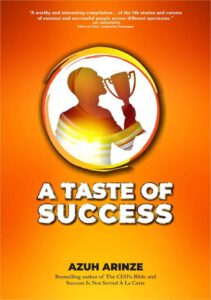By Azubuike Ishiekwene
First, I want to thank all of you, both immensely and immeasurably, for the show of love and affection yesterday.
Today, however, I want to share with you the foreword to one of the two new books, A TASTE OF SUCCESS.
It was graciously written by one of Nigeria’s foremost journalists, a former editor of The Punch and currently, the editor-in-chief of Leadership Newspaper, Mr. Azubuike Ishiekwene.
Enjoy!
Except, perhaps in the academia, book publishing appears to be a dying business. Gone are the days when students competed over who read what new books or bestsellers.
Yet, this decline has not deterred some writers. Azuh Arinze is one of this rare breed.
In this age of instant noodles and scarce attention span, Arinze’s “A taste of success”, is a staple for those who still prioritize stamina and value.
It’s not the run-of-the-mill motivational variety, often quickly assembled by authors who claim that if you have not read their collection you won’t get far in life.
From interviews and personal encounters – at which he is proving to be quite gifted – the author shares vivid examples and anecdotes from the lives of some of Nigeria’s most successful professionals, leaving you with multiple exemplary pathways to success.
Sure, there are many who might think they have succeeded already – or perhaps reached their professional peak.
What’s the point? Transition. Reinvention. Or perhaps, leverage. And these are not mere prescriptions. They were distilled from the experiences of leading professional lights, from Segun Osoba to Mazi Sam Ohuabunwa, and from Bruce Onobrakpeya to Okey Ndibe and Kunle Afolayan.
All who work hard and remain steadfast are eligible to a taste of success, and these are explicitly the contents of the many ‘case studies’ presented by the author.

The 25 chapters of the book are all stand-alone. The author makes it easy for a tempestuous reader to browse through the book reading different chapters by preference. That perfectly suits the reading culture of today alluded to in the beginning of this foreword.
One streak is common and runs through every chapter: the interviewees narrate how they navigated through practical experiences of life and made a success of it. Their accounts are by no means some utopian fantasy full of persuasive and poetic abstractions of the “how to become a millionaire” motivational books.
The book is also unique in that there is no alpha source, no magical prescription enticing the reader that anyone with the faith of Daniel can go in and out of a lion’s den and remain alive – a trait in motivational books that encourages impractical, overambitious and unrealistic pursuits.
From the many cases he profiled, which budding artist, for example, would not want to read an interview and pick from Onobrakpeya a snippet or two, of how to be a successful painter, sculptor, craftsman or an arts teacher?
The writer has excerpted and documented one-on-one accounts which form the building blocks of their success stories. His samples cut across the media firmament, sports, politics, entertainment, creative arts, administration and business.
The question-and-answer interlude allows the reader to experience moments of reflection and pause, and every new question brings about an anticipation and a transition. So the reader does not lack a choice of models whose life stories he/she might want to scrutinize in order to draw a lesson or two.
Again, one can deduce through intelligent inference, that success should not be construed as mere material affluence – as huge bank reserves or sprawling estates. A sterling reputation for excellence and professionalism are intangible barometers for measuring success.
What’s more, the reader can learn from the moral precepts of old horses who just wouldn’t compromise standards or professional ethics for self-interest and personal advantage. These days, people breach all moral boundaries to acquire material wealth – the sort of kleptomania that stunned one anti-graft agency to recommend psychiatric tests for people holding public offices in Nigeria.
In my opinion, the writer has assembled a miniature compendium of the life stories and careers of eminent and successful people across different spectrums. It is a worthy and interesting compilation and will make a good collectors’ item.
Who knows, I might have been more successful if I had read it earlier!
*Ishiekwene, FNGE, is a foremost journalist and Editor-in-Chief of Leadership Newspaper.